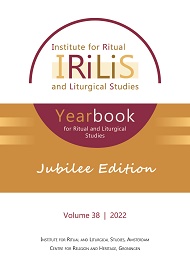Ritual Techniques in Affliction Rites and the Lutheran-Catholic ecumenical Liturgy of Lund, 2016
DOI:
https://doi.org/10.21827/YRLS.38.22-41Keywords:
reconciliation, Lutheran, Catholic, Lund 2016Abstract
Protest and reconciliation rituals play a contested but important role in social change. This essay analyzes how rituals of reconciliation effectively negotiate between competing factions and norms by using ritual techniques as embodied symbols. Against the horizon of theory from Victor and Edith Turner and Cas Wepener, participant observation of the Lutheran and Catholic Joint Commemoration of the Reformation “Common Prayer” in Lund, Sweden on October 31, 2016 reveals five stages: crisis/diagnosis, redress, forgiveness and acceptance, binding, and reparative mission. Each is marked by its own characteristic techniques, whereas some symbolic elements manifest the different stages throughout the liturgy. This liturgy demonstrates how one liturgy can speak to various factions and stages in the process of accommodating a new norm (Christian unity) within a contested set of identities (“Lutheran” and “Catholic”). It is in the stages of forgiveness and binding that the relationship between the ritual-symbolic realm and the real work of social reconciliation is most directly visualized.
Published
Issue
Section
Copyright (c) 2022 Kimberly Hope Belcher

This work is licensed under a Creative Commons Attribution 4.0 International License.


